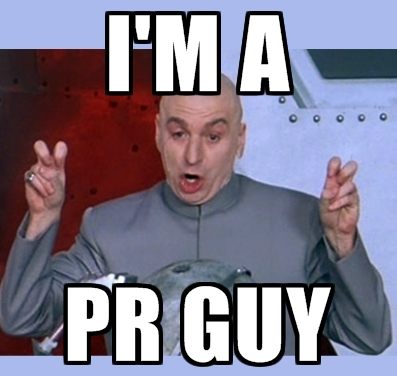The worlds of PR and SEO have grown and matured a lot in the past decade, and are now getting along, playing nice, and even helping each other with their homework. We’re seeing increasing integration between SEO and PR, and for digital marketers, it signals a growing number of opportunities to get your clients or brand noticed – and linked to – online.
In the earlier days of digital marketing, the brands and agencies that copped on early and who knew how to do digital marketing the right way, weren’t necessarily hiring “marketers” into their teams. They were hiring people like journalists and ex-editors-in-chief of major print magazines to head up their marketing efforts, because they knew that great content writing and research skills were the key to carving out their brands’ identities on the web.
In 2015, the trend seems to be continuing, albeit shifting in favour towards our friends sitting over in the PR department. Now, the best agencies and marketing-savvy brands are seeking out public relations folks to look after their outreach campaigns, with some very important goals in mind: better brand image in the public eye, and more high-quality backlinks to their site (which we all know helps to boost search engine rankings).

Well – you’re gonna want to be. Image credit
So with this in mind, we’ve discussed the top three reasons why we think that digital PR is going to continue to be a bigger and bigger part of SEO – and vice versa:
1. Because (gasp!) technical onsite optimisations will really only take you so far
One of the best ways to boost SEO rankings is no doubt to start by looking at the house in which your company lives on the web – your website. If your website is not thoroughly optimised for both search engines (and for those human beings which also happen to be looking at it), then that’s the first thing you should look to improve. Need somewhere to start? Check out our blog post on how making small SEO changes to your site can have a big impact.
But once you’ve implemented schema markups, submitted XML sitemaps, sorted your canonicals and 301 redirects, tidied up your site navigation, implemented plenty of internal links between all of your pages, optimised the shiz out of your meta titles and meta descriptions, alt-tagged your images, give your site more speed than a Bugatti Veyron, and written some kick-ass, keyword-optimised content on all of your pages, soon you’re going to start running out of ideas for stuff to do onsite – Apart from blogging regularly of course – you should definitely always be doing this. Seriously, we mean always.
Sure, you can keep tweaking and shuffling the same few small things around, all the while staring at your screen looking for tiny shifts in Google Analytics data until your eyeballs explode into fireworks of primary-coloured bar graphs and pie charts. But what’s really going to get you where you want to be in search engine results pages is big, fat, juicy links. On which sites though, you ask? Well, that brings us to point 2.
2. Because blogs, bloggers and other online influencers are (still) the new magazines
You only need to take one quick look at the front row of New York or Paris Fashion Week to see that those who have blogs and other online resources are slowly elbowing out the overlords of “traditional” media (sorry Vogue and Harper’s). But don’t think that just because you’re not a fashion house selling $3,000 socks that your industry is immune from the growing importance of focusing your marketing efforts on important online influencers – non-fashion-related business had better wise up as well.
Blogger outreach has been on the rise and rise (and rise) for years now, and it’s only gaining in momentum. There are hundreds of thousands of independent blogs out there about all kinds of different topics – you name it, someone is blogging about it, and likely with a huge following. More and more people are realising that to be successful online, you’ll want those bloggers to be talking about you too.
For your SEO efforts to be really successful, you’re going to need more links than bigfoot’s bicycle chain, and not just any old links – good ones too, like those from aforementioned bloggers with lots of fans, as well as quality news websites and websites of educational institutions like colleges and universities. PR is perfect for this because it allows you to develop relationships with these key influencers in your industry, before you even reach out to them with an attractive incentive for them to publish a link to your site (whether that inventive is a great piece of content, giveaway, or competition).
3. Because an SEO-savvy person is actually the most qualified to carry out modern-day digital PR
PR these days is about more than just sending out press releases to every magazine and newspaper in the country every time your company so much as buys a new pot plant for the office. And, as we mentioned earlier, SEO is about more than just making constant small tweaks onsite.
When it comes to conducting a link building campaign, being both SEO and PR savvy is definitely a huge plus, for a number of different reasons. Firstly, a good SEO/PR hybrid should be able to kick things off by identifying which bloggers, news websites, and other online influencers you should be targeting with your efforts. They’ll do this through extensive manual research, as well as utilising an arsenal of backlink analysis tools to identify what a brand’s competitors are doing in terms of outreach and link acquisition.
Next, they should be able to come up with engaging and creative pieces of content, ideas, offers, or competitions to entice bloggers and other influencers to link back to your site.
Then, when it comes time to placing those all-important links and content on influential, high-quality websites, they’ll know all of the nitty-gritties, right down to what the anchor text of that link should ideally be, and which page of your website the link should point to (if you have control over all of these things of course).
—
So, for businesses and agencies chasing the holy grail of marketing that is the all-important backlink, a mix of PR and SEO skills can really give you the edge over your competitors. Don’t have a lot of experience with SEO or PR? Get started by checking out Search Engine Land’s Public Relations for SEO Guide.
Now if you’ll excuse us, we’re off to write a press release about this blog post we’ve just written… (not).
How does your company like to conduct digital PR? Tell us in the comments section below.
Further reading:
- PR News Wire: Integrating Public Relations with SEO Strategies
- SEO-PR: Online Public Relations
